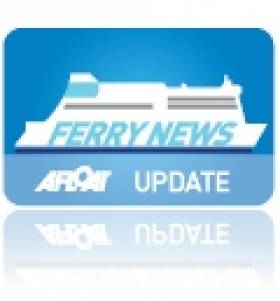Displaying items by tag: RoPax charters
Ropaxs’ Chartered to Irish Ferries to See Epsilon Exit Service While Norbay Debuts on Ireland-France Route
ICG's charter of Epsilon for Irish Ferries which for almost a decade operated Dublin-Holyhead and between the Irish capital and Cherbourg, France, is to complete its final sailing tomorrow, writes Jehan Ashmore.
The 165 freight trailer unit / 500 passenger capacity ropax built by Italian shipyard Visentini in 2011, departed Dublin Port last night. At time of writing, today 12 noon, the vessel passed Wolff Rock Lighthouse (see unrelated CLdN story) off the English coast, at Land’s End in Cornwall.
Epsilon which had been on routine Dublin-Holyhead duties, is deployed to cover the Dublin-Cherbourg route as mainstay, cruise-ferry W.B. Yeats, this week went to Harland & Wolff, Belfast for annual dry-docking, leaving Ulysses to maintain the Irish Sea route. The ropax over the years, asides the Ireland-Wales link operated at weekends the Irish capital-continental connection and mainly during the winter.
The ropax registered in Bari, on the Adriatic Sea, first entered service for Irish Ferries in December, 2013, then named Cartour Epsilon, having operated to Sicily for Italian owner, Cartour & Touriste (C&T). The vessel was renamed and reflagged to Cyprus, operates a no-frills economy service as the vessel, been of a ropax design is more freight-orientated with limited facilities for motorist-passengers.
Due to the current adverse weather, according to Irish Ferries sailing updates, tonight’s return crossing at 18:30hrs from Cherbourg to Dublin will be delayed by up to 5.5 hours. The Epsilon is to arrive in Dublin tomorrow late afternoon, and so complete its career with the Irish operator.
Replacement for the Epsilon on the Ireland-Wales and France routes will be another ropax, P&O Ferries 125 trailer unit/225 passenger Norbay (see Holyhead entry) which is to make its maiden Dublin-Cherbourg sailing this evening, departing at 1830hrs and arrive in Cherbourg the next day at 1430hrs. The French port has a connection with P&O, among them, that they were the first ferry company to operate the direct route to the Irish capital, which in 2003-2004 was run by ropax European Ambassador, currently Stena Nordica on the Swedish operator’s Rosslare-Fishguard route.
As Afloat previously reported, P&O have time-chartered the 1992 built Norbay to ICG for six months Irish Ferries operations and should they require, there is an option to extend the charter. Likewise of Epsilon, the ropax will be offering a no-frills economy service compared to the cruise-ferry W.B. Yeats. Irish Continental Group (ICG)’s charter of Norbay however, given the timeframe is a short-term measure, until the Dublin-headquartered Group can secure another more suitable vessel, noting Epsilon with its larger capacity for freight and passengers.
Epsilon in more recent years was owned by Euroafrica Shipping Lines, however the ropax is understood to be heading for Scandinavia where the company have links with Unity Line of Poland, having acquired the ropax.
The ropax is expected to join the Polish company’s fleet. Of the 7 strong fleet, Unity Line owns four ferries, Polonia, Skania, Wolin and Gryf, whereas three belong to Euroafrica, the Copernicus, Galileusz and Jan Śniadecki.
The combined fleet run on two routes across the southern Baltic, Świnoujście - Ystad (Sweden) and Świnoujście – Trelleborg (Germany).
#FerriesNewZeland – Recently displaced from Baltic Sea service the Stena Alegra, the former Merchant Ferries ro-pax ferry Dawn Merchant on the Irish Sea, is to be chartered to New Zealand ferry operator Interislander, writes Jehan Ashmore.
The chartering of Stena Alegra follows damage last month to the starboard shaft and propeller of Aratere, the workhorse of the Interislander fleet which accounts for 45% of the total capacity of the three vessel operated Wellington-Picton route.
Stena Alegra is due to reach New Zealand in late December with the aim of having the 350 passenger vessel in service by early January 2014.
Interislander's decision to charter Stena Alegra, which is owned by Stena Finance BV and managed by Northern Marine Management, will assist greatly with capacity issues during the current peak summer period as Aratere is expected to be out of service for the next six months while repairs are carried out in dry-dock.
Fleetmates of the Aratere are the Arahura and as previously reported on Afloat.ie, Irish Continental Group's chartered Kaitaki which was launched as Isle of Innisfree in 1995 for ICG subsidiary Irish Ferries routes on the Irish Sea. Her charter was extended earlier this year for a further four years until 2017.
Incidentally this is a year shorter to the timeframe of the chartered Epsilon to Irish Ferries, due to enter service this month on Dublin-Holyhead route.
In addition to Epsilon boosting capacity on the Irish Sea route, the Italian flagged vessel is to launch a weekend only but year round operated Dublin-Cherbourg route starting in mid-January 2014.





























































